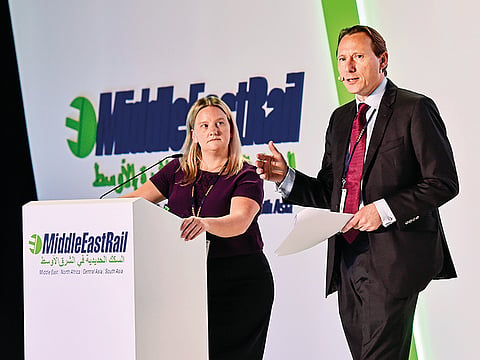Private firms set to benefit from new wave of rail projects
Gulf states are turning to public-private partnerships for next wave of infrastructure

DUBAI:
If you don’t know how to do public-private partnership (PPP) projects, partner with a firm that does — and do it quickly.
Those were the closing words of Joss Dare, Partner and Head of Middle East at international law firm Ashurst, at his keynote seminar at the Middle East Rail conference, at Dubai World Trade Centre, on Tuesday.
“The market is on the verge of a springboard into the future which is really exciting,” he said, “but it is a future which is different and which involves PPP.”
A number of major infrastructure projects in Gulf Cooperation Council (GCC) countries had been put on hold during the period of low oil prices, Dare’s Ashurst colleague, senior executive Yvonne Cross, pointed out, and even after the oil price recovery were unlikely to proceed purely on state funding.
“We’re in the middle of a transition phase, I think, from the old world to the new,” Dare said.
“2017 was very much all about transition and not about delivery — there were hardly any new projects introduced into the market in that period. It’s my firm hope that 2018 will be different.”
Dare presented a “very impressive” list of regional rail projects, noting, “There’s projects across the GCC, in the UAE, and a huge amount in Saudi Arabia in particular.
“Nearly all those projects, one way or another, involve private finance. They are PPP projects, particularly in Saudi Arabia.”
Alongside PPP, Dare looked at other ways railway projects had been paid for around the world.
A number of cities, including Hong Kong, London and Sydney, had raised money through land value capture, selling rights to develop properties near stations.
“I think we all know that rail infrastructure has a transformative effect on land values in the immediate vicinity,” he said. “What’s tended to happen historically is that canny private sector developers have swooped in at the right moment to capture that value for themselves.”
But public infrastructure developers could, with the right mechanisms in place, use the increase in land value to fund their projects.
“It’s happening a little bit in the region already,” he added. “The RTA is looking at the station cities project here in Dubai.”
Dare said land value capture could raise significant amounts, citing Crossrail One in London, which aimed to raise £500 million (Dh2.56 billion) though such a scheme.
PPP projects usually relied on private financing rather than public funding, Cross pointed out.
“Government ultimately is reducing the technical and operational risk because they have a private sector expert on board right from the beginning to engineer it, design it, build it, deliver it, run it,” she said.
“We also know that generally speaking the private sector is better at delivering these major infrastructure projects, because they are ultimately driven by having to get to completion so that they can start servicing their debt.”
However, regionally, there was a lack of awareness in the region that such partnerships were not free, she said, and that if the project were terminated, governments would have to take on the debt.
GCC rail projects pipeline
GCC-wide
GCC Railway
GCC Hyperloop
UAE
Etihad Rail Stage 2
Abu Dhabi Metro and Tramway
Dubai Metro — Green and Red Line Extensions
UAE Hyperloop
Abu Dhabi Airport Midfield Terminal Rail Link
Dubai Tram Phases 2 and 3
DWC Monorail
Dubai Trolley Bus Phases 2 and 3
Oman
Oman Mineral Railway PPP
Oman National Railway
Saudi Arabia
King Salman University Transit System
Yanbu-Jeddah PPP
Riyadh-Damman Electrification
Riyadh-Riyadh Link
Saudi Landbridge PPP
Saudi O&M privatisation
Makkah Metro PPP
Jeddah Metro
Damman Metro
Corniche Tram, Jeddah
Source: Ashurst
Sign up for the Daily Briefing
Get the latest news and updates straight to your inbox



